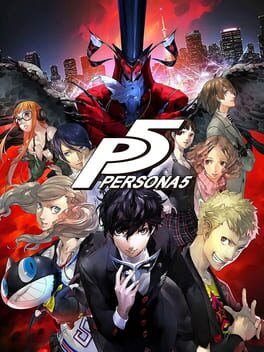ltrain500
2001
2003
2013
2017
2016
Spoilers ahead:
Persona 5 is a rich, enthralling, and immersive game... with some severe, severe, severe flaws. As some kind of disclaimer, I feel I should draw attention to the fact that I'm a newcomer to the Shin Megami Tensei franchise, and Persona 5 served as my introduction to the series, meaning that the adjustment period to the game's flow and mechanics felt quite severe to me. Despite it perhaps being a relatively steep curve, once sufficiently immersed within the general flow and pace of the game, it actually felt impossible to imagine the game without it. The game only truly begins once you become the traveler between the physical world and the cognitive one. However, goddamn does it take an absolutely absurdly long stupid ass fucking time to even reach this point. Persona will easily yield you over 90 hours of accumulated gameplay, yet an overwhelming majority of this time felt yoked to the game's endless dialogue and text in-between missions. This text, which is the real main character of the game, serves as both a welcome medium between you and the game's endless array of lovable yet flawed characters, and as a sluggish conveyor belt slowly yet surely carrying your begrudging self through the game's needlessly convoluted and seemingly endless narrative.
There is both a certain kind of joy and certain kind of dread as you navigate the game's narrative through its "levels" - the palaces. I had limited experience with dungeon crawlers, and so these palaces initially felt a bit bewildering or overwhelming at first, in particular Kamoshida's. However, the awe felt when first experiencing Kamoshida's palace is diminished as you complete more and more palaces until eventually the intrigue surrounding them dissipates, or rather, it evolves into a feeling more akin to tedium. There are highlights interspersed of course - I particularly enjoyed Futaba's and Sae's palaces. Yet, by the end, Shido's palace, with its endless mouse-capades, feels more like a chore or task done purely out of some kind of strange obligation rather than a recreational activity. And for a real heart-sinker, the actual, final "palace", Mementos, is boredom and repetition ad infinitum. A more fitting final boss for this level than Yaldaboath, would have been Sisyphus, or perhaps his rock.
On the topic of Yaldaboath, the game's "true" final boss, I have yet to fully understand what he even is. The version of this "god" that appears in Persona 5 does not truly align with the Biblical or Mystical texts of his origin, and while the usage of angels/demons/gods/etc of Persona and Shin Megami Tensei are of course eclectic at best, Yaldaboath does even fit in with the game's supposed thesis, yet alone its conclusion. Herein is perhaps the biggest issue with Persona 5 thematically - while it draws from every religious and spiritual source imaginable, it refuses to commit to any, and the sudden appearance of an entity like Yaldaboath becomes a "jump the shark" moment more than anything else. I cannot find it in myself to forgive the dissonance of deities being treated essentially like Pokemon with biblical names, while suddenly expecting any kind of gravitas from these deities.
In terms of actual gameplay - while the battles in Persona do have an addictive quality to them and are stylish beyond words, the mechanics of battle left much to be desired. The possible fluctuations in battle were always exciting as you tried to wrest control back from the demons yet these fluctuations seemed much too few and far between. More often than not, battle seemed to yield only two possible results. The first (which seemed to occur an overwhelming amount) was that you and your party were in firm control of the battle from start to end with little to no surprises. The second was a sort of false stalemate where your opponent engaged in a series of repetitive moves that would really only temporarily hinder you before you inevitably, and usually without fail, gained the secret to counter them. Of course my experience is based on the Normal difficulty setting in which I played, but I can't really imagine the Hard difficulty doing away with this issue since I believe the main problem was the limited number of moves the enemies you encountered possessed. In comparison to the essentially infinite amount of moves you possessed, the enemy would only have around 3-4, and would only really use about half of these. While I can understand the reasoning behind this - presumably to ensure the player can customize their personas to their heart's content, I can't help but believe a balance could've been struck and the problem rectified because the end result is that rather than an engaging encounter where the truly unpredictable is manifest, what ends up actually happening in a worst-case scenario for you is a long and tedious battle focused less on strategy and nous and more on simply going through the motions. And this sentiment goes tenfold for the boss battles at the end of every Palace.
Finally, as for what makes the game an absolute joy - the social links you form and their respective relationships with the game's palaces. The social simulator aspect of this game is far and away its most appealing feature. It really is something special to behold. Persona utilizes an easily-recognizable trope that's nearly ubiquitous in a variety of different mediums, but particularly so in anime. Here I'll refer to it as the "heart of gold" trope. Every social bond you form in Persona will follow the exact same formula - a troubled individual with the aforementioned heart of gold struggles to do right in a world that seems overwhelmingly structured to perpetually combat what is right. And as such it becomes almost impossible to not sympathize with such characters despite how caricaturistic they may appear at first.
These social bonds, in spite of the formulaic game elements they're tethered to, allow you to truly stake yourself in the game's world. They are not mere quest-givers you oblige in order to level up your stats. Instead, they act as the tent-poles giving you the footing necessary to enjoy the game itself. Many will be drawn to the numerous romantic encounters possible, and the spicy and delicious fact that the morality (or immorality) of these liaisons do not encumber or intervene in your quest to be Tokyo's #1 playboy. From your local doctor to the girl sitting in front of you in homeroom to your homeroom teacher, Persona knows precisely what it is that your romantic, or possibly perverted mind wants, and will give it you... with just enough class and style. And if you don't want to be a Japanese Lothario, you're in luck as it is quite impossible not to root for your male/platonic companions, each on an engaging journey through self-actualization and overcoming of trauma.
And yet, really the game itself remains quite indifferent to these social bonds... not only are not under any obligation at all to engage with these characters, the game does not really even give you the opportunity to complete the bonds for most of its characters. Typically, it would be quite ironic for a game to neglect its most redeeming feature, yet it's actually quite in character for this particular game to do so. Persona 5 after all, is a curious case in which both its strengths and its flaws are heavily accentuated to the breaking point. Perhaps if the game had really stuck to and committed to any of the concepts it attempts to interrogate - duality, masks, PERSONAS, the experience would be more rewarding. As is however, well, you'll still love it, you'll still hate it, you'll still be addicted, you'll still neglect it, you'll still be immersed, you'll still be repulsed. And you'll still spend 90+ hours on it.





